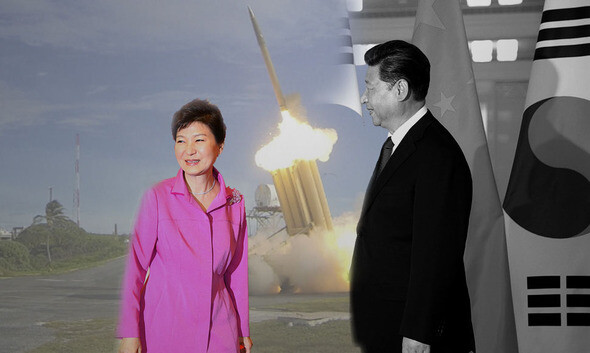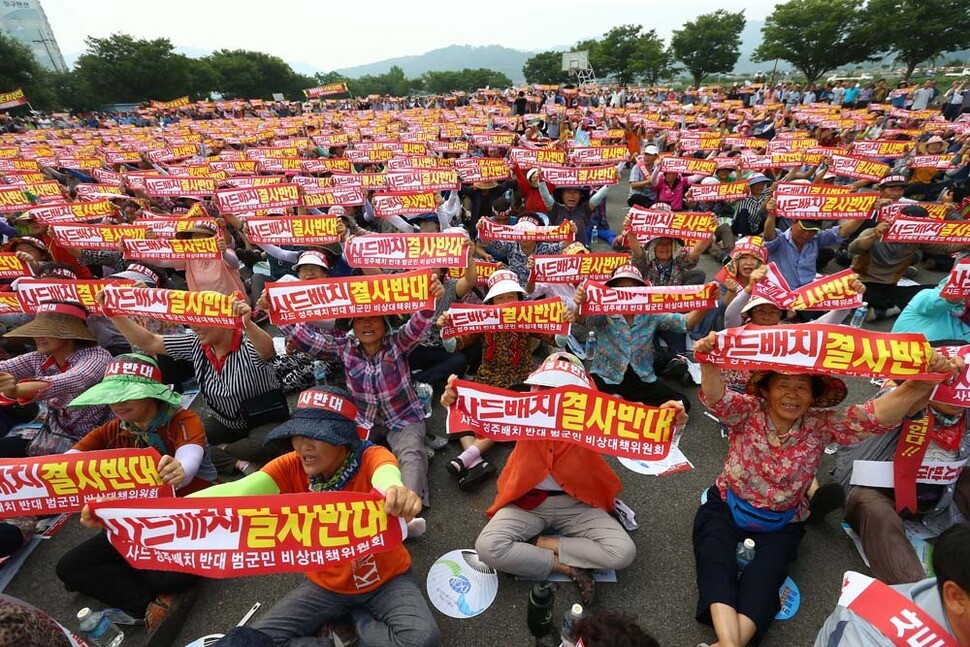hankyoreh
Links to other country sites 다른 나라 사이트 링크
[Column] How Pres. Park’s see-saw diplomacy is shredding the economy

Immediately after South Korean President Park Geun-hye’s summit with Chinese President Xi Jinping in Beijing on Sep. 2, 2015, the Blue House issued a press release that it had thrown together.
The release claimed that Xi had said in his opening remarks that cooperation between him and Park had brought South Korea and China to their “most amicable relations in history.” The phrase “the most amicable relations in history” caught the attention of the media, and it was immediately given major coverage online.
But just a few hours later, the Blue House issued a correction, explaining that there had been a mistranslation. In the updated press release, Xi’s was quoted as saying, “South Korea and China are amicable neighbors.”
While it was not confirmed whether the mistranslation was an intentional exaggeration on the part of the Blue House or just a mistake, what is clear is that the Blue House wanted to widely publicize the beginning of a honeymoon period for South Korea and China.
But less than one year later, the pendulum has swung in the opposite direction. With the South Korean and US governments announcing their decision to deploy the THAAD missile defense system with US forces on the Korean peninsula, South Korea’s relations with China are careening toward what could be called the most adversarial relations in history.
South Korea ought to be adopting a pragmatic diplomatic approach that seeks to balance the US and China, but the Park administration has time and time again resorted to “see-saw diplomacy.” By ricocheting wildly from China to the US, Park has let things get out of control.

The most pressing concern is the economy. As the Chinese government and media warned of political and economic retribution, a report on July 11 said that China’s JAC Motors had stopped producing electric cars powered by batteries made by Samsung SDI.
While South Korea’s Ministry of Trade, Industry and Energy explained that production had stopped before the announcement was made to deploy THAAD, this is a troubling sign for South Korean companies who remember the nightmare of the “garlic crisis.”
In June 2000, the South Korean government raised the tariff rate on Chinese garlic from 30% to 315% as a measure to protect South Korean farmers. In retaliation, China suspended imports of South Korean mobile phones and polyethylene.
Imports of Chinese garlic at the time were worth US$9 million a year, while exports of mobile phones and polyethylene were worth US$500 million. Shaken by this disproportionate counterattack, the South Korean government backed down and reversed the safeguard just one month later.
Since China is currently a member of the World Trade Organization (WTO), some experts believe it is unlikely to engage in overt retaliation in trade. But China can still damage the South Korean economy by erecting non-tariff barriers to trade or by inflaming anti-Korean sentiment.
The spread of anti-Korean sentiment, for example, would strike a serious blow to South Korean exports and the tourism industry. The inevitable result would be falling exports in the key areas of semiconductors, mobile phones and cars. And if Chinese tourists take their money elsewhere, it would cause a chain reaction that affects not only the tourism industry but also the logistics industry and the cosmetics industry.
Unlike 16 years ago, when the garlic crisis occurred, China is now South Korea‘s number one economic partner. Last year, 26% of South Korea’s exports went to China - roughly equivalent to the combination of exports to the US (13.3%), the EU (9.1%) and Japan (4.9%). Chinese investors also hold 18 trillion won in South Korean securities (18.4%), the most of any country. Of the foreign tourists who visited South Korea last year, 45% were from China.
The South Korean economy is currently stuck in the quagmire of low-growth, amid a protracted domestic downturn and slump in exports. And the Park administration has added to these unfavorable factors the serious risk factor of THAAD deployment.
While former president Roh Moo-hyun was in office (2003-2008), the Saenuri Party slammed him as “the president who abandoned the economy.” But Park, some say, was not content to abandon the economy - she is ripping it to shreds. If she keeps this up, that is exactly what she will do.
Park insists that this is her responsibility, but of course it‘s the people who have to suffer.
By Ahn Jae-seung, editorial writer
Please direct questions or comments to [english@hani.co.kr]

Editorial・opinion
![[Editorial] Exploiting foreign domestic workers won’t solve Korea’s birth rate problem [Editorial] Exploiting foreign domestic workers won’t solve Korea’s birth rate problem](https://flexible.img.hani.co.kr/flexible/normal/500/300/imgdb/original/2024/0626/5517193887628759.jpg) [Editorial] Exploiting foreign domestic workers won’t solve Korea’s birth rate problem
[Editorial] Exploiting foreign domestic workers won’t solve Korea’s birth rate problem![[Column] Kim and Putin’s new world order [Column] Kim and Putin’s new world order](https://flexible.img.hani.co.kr/flexible/normal/500/300/imgdb/original/2024/0625/9617193034806503.jpg) [Column] Kim and Putin’s new world order
[Column] Kim and Putin’s new world order- [Editorial] Workplace hazards can be prevented — why weren’t they this time?
- [Editorial] Seoul failed to use diplomacy with Moscow — now it’s resorting to threats
- [Column] Balloons, drones, wiretapping… Yongsan’s got it all!
- [Editorial] It’s time for us all to rethink our approach to North Korea
- [Column] Why empty gestures matter more than ever
- [Editorial] Seoul’s part in N. Korea, Russia upgrading ties to a ‘strategic partnership’
- [Column] The tragedy of Korea’s perpetually self-sabotaging diplomacy with Japan
- [Column] Moon Jae-in’s defense doublethink
Most viewed articles
- 1After 7 years, South Korea resumes live-fire drills on islands a stone’s throw from North
- 2[Reportage] On Yeonpyeong Island, residents fear military drills will snowball into war
- 3‘Disposable’: How illegal temp work practices push migrants in Korea into risky jobs
- 4Nuclear South Korea back up for debate as North cozies up to Russia
- 5CIA record confirms US ‘completely destroyed’ Seoul’s Haebangchon in 1950 bombardment
- 6US says it will ‘keep an eye on’ whether North Korea sends troops into Ukraine
- 7Son Heung-min’s father, brother accused of child abuse at football academy
- 8Dispatched into unknown danger, foreign day laborers were defenseless against blaze
- 9How 17 km of river could be a fertile bed for NK-China-Russia cooperation
- 10No Japanese, Filipinos, Vietnamese or dogs